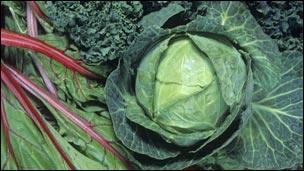Green leafy veg 'may cut diabetes risk'
- Published

Green leafy veg, rather than a healthy diet in general, were linked to benefits
A diet rich in green leafy vegetables may reduce the risk of developing diabetes, UK research says.
In an analysis of six studies into fruit and vegetable intake, only food including spinach and cabbage was found to have a significant positive effect.
A portion and a half a day was found to cut type 2 diabetes risk by 14%, the British Medical Journal (BMJ) reports.
But experts urged people to continue to aim for five portions of fruit and vegetables a day.
The researchers from Leicester University reviewed data from the studies of 220,000 adults in total.
They found that eating more fruit and vegetables in general was not strongly linked with a smaller chance of developing type 2 diabetes but "there was a general trend in that direction".
Yet when it came to green leafy vegetables, which the researchers said also includes broccoli and cauliflower, the risk reduction was significant.
The team calculated that a daily dose of 106g reduced the risk of diabetes by 14% - a UK "portion" is classed as 80g.
It is not clear why green leafy vegetables may have a protective effect but one reason may be they are high in antioxidants, such as vitamin C and another theory is that they contain high levels of magnesium.
Study leader Professor Melanie Davies, professor of diabetic medicine at the University of Leicester, said the message to eat five portions of fruit and vegetables a day remains an important one.
But she added: "People like very specific health messages.
"We know that intake of fruit and vegetables is important, but this study suggests that green leafy vegetables seem to be particularly important in terms of preventing diabetes."
The team are now planning a study in people at high risk of developing the condition to see if increasing their intake of vegetables like spinach and kale can help to reduce their chances of being diagnosed with diabetes.
Fruit and veg
In 2008/09, the National Diet Nutrition Survey showed that, although fruit and vegetable intake has risen over the past decade, only a third of men and women eat the recommended five-a-day.
In an accompanying editorial in the BMJ, Professor Jim Mann from the University of Otago in New Zealand, stressed that the message of increasing overall fruit and vegetable intake must not be lost "in a plethora of magic bullets," even though green leafy vegetables clearly can be included as one of the daily portions.
Dr Iain Frame, director of research at Diabetes UK said: "We already know that the health benefits of eating vegetables are far-reaching but this is the first time that there has been a suggested link specifically between green leafy vegetables and a reduced risk of developing type 2 diabetes."
But he warned the evidence was limited and it was too early to isolate green leafy vegetables and present them alone as a method to cut the chances of developing the condition.
"We would be concerned if focusing on certain foods detracted from the advice to eat five portions of fruits and vegetables a day, which has benefits in terms of reducing heart disease, stroke, some cancers and obesity as well as type 2 diabetes."
Diabetes UK is currently funding research into whether fermentable carbohydrates found in foods such as asparagus, garlic, chicory and Jerusalem artichokes could help weight loss and prevent Type 2 diabetes.
- Published15 June 2010